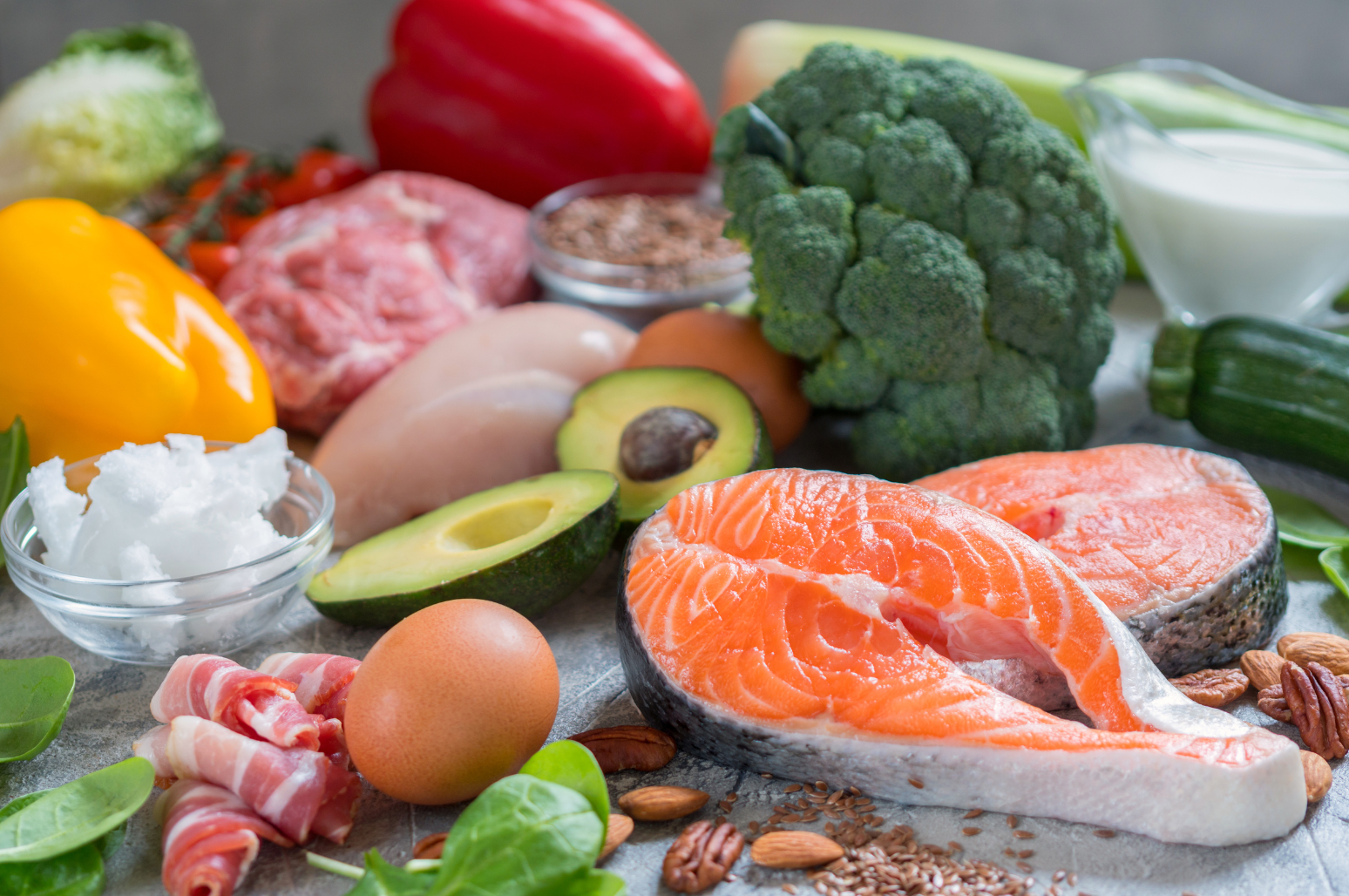What is Ketosis? A Beginners Guide

Ketosis is a natural state of metabolism that can be achieved by following a high-fat, low-carb ketogenic diet. Ketosis can have impressive health benefits from weight loss to seizure reduction. To understand ketosis, you’ll need to understand ketones.
What Happens When You’re in Ketosis?
When you’re keto, your body shifts into ketosis and produces ketone bodies out of fat. Your body primarily uses these ketones for energy instead of carbs. When there’s limited access to glucose (blood sugar), your body goes into ketosis [1].
Ketosis can also happen during other circumstances, such as fasting, starvation, and pregnancy [2] [3] [4] [5].
To get into the metabolic state of ketosis, people typically need to consume fewer than 50 grams of carbs per day and sometimes as few as 20 grams per day. This means you have to remove certain food items from your diet that would exceed your carb count, such as sugary soft drinks.
When you’re eating a low-carb diet, levels of the insulin hormone decline, and your body releases fatty acids from your fat stores in large amounts. A large portion of these fatty acids is transferred to your liver, where they’re turned to ketones (ketone bodies). Ketones can provide your body with energy. Ketones can also cross the blood-brain barrier and provide energy for your brain when there isn’t any glucose.
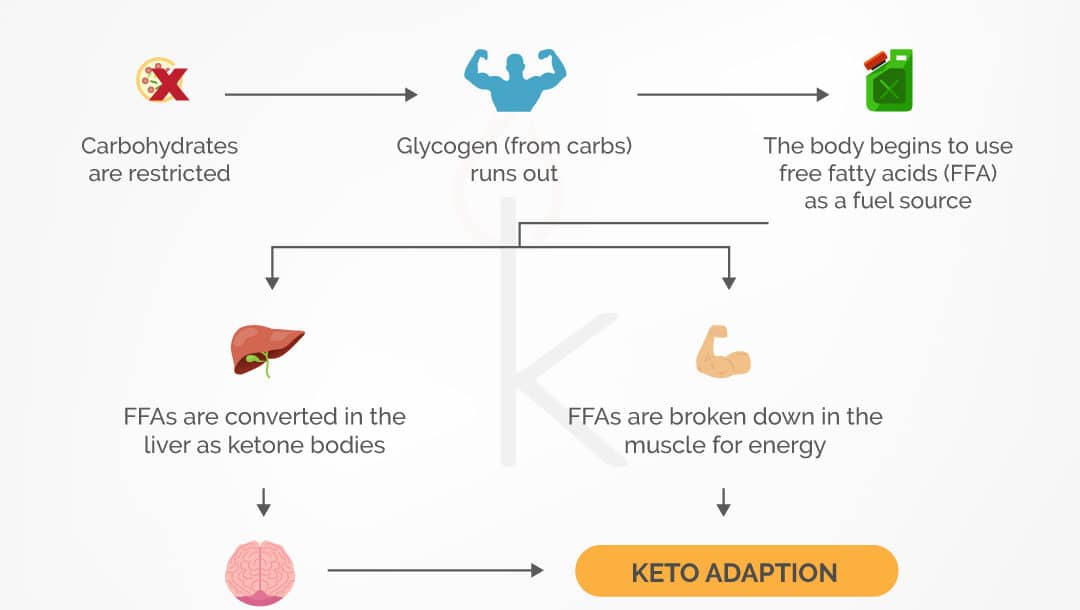
What are the Benefits of Ketosis?
The metabolic state of ketosis might have several health benefits, such as seizure reduction and a reduction in inflammatory markers [6].
Research also suggests the ketogenic diet has metabolic advantages and can be beneficial for the mitochondria and various diseases and conditions, such as multiple sclerosis, autoimmune diseases, and inflammatory dermatologic disease [7] [8].
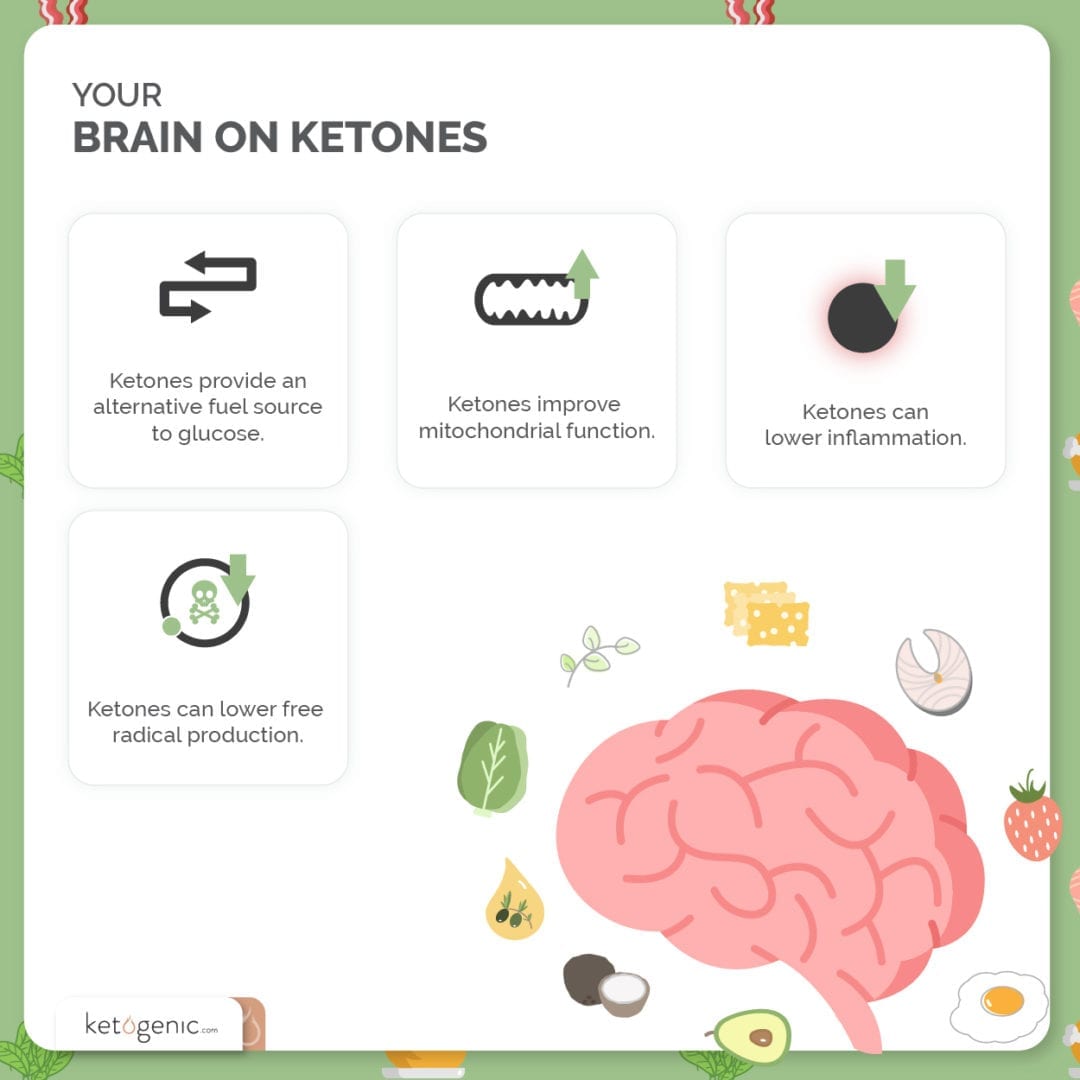
The brain actually thrives on ketones. You might be surprised to hear that it’s a common misconception that the brain needs glucose for fuel.
Ketones can satisfy most of your brain’s needs. While in ketosis, your body can still use protein to produce the little glucose your brain needs. This is called gluconeogenesis. Your brain can function perfectly well with ketosis and gluconeogenesis.
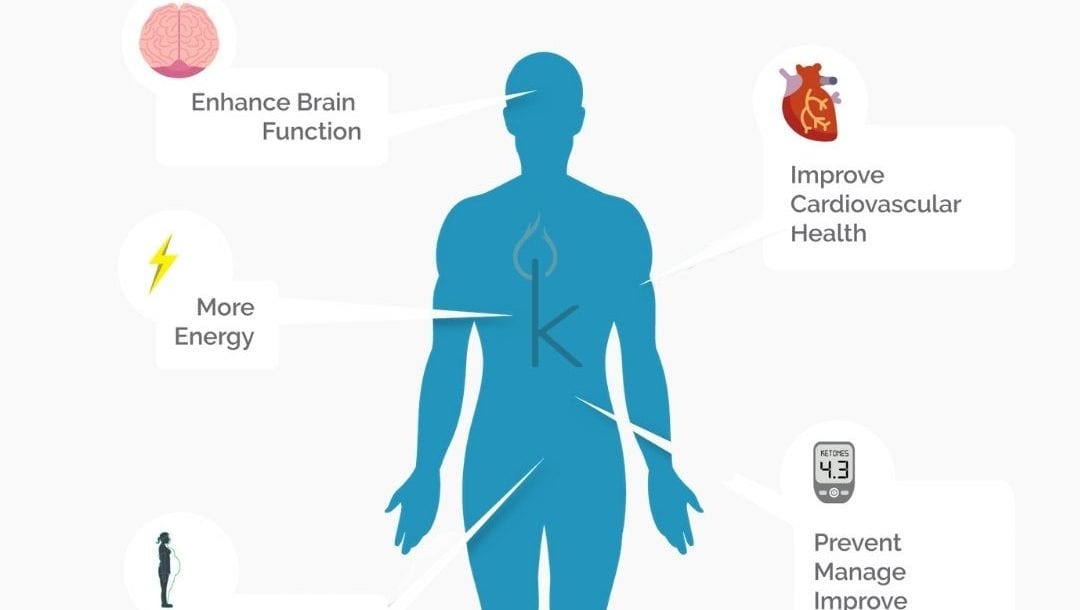
What is Ketoacidosis?
With ketoacidosis, the bloodstream has extremely high levels of ketones and glucose (blood sugar). This causes the blood to become acidic, which is especially harmful.
Ketoacidosis is usually associated with uncontrolled type 1 diabetes and, less commonly, type 2 diabetes. Severe alcohol abuse might also lead to ketoacidosis [9] [10].
For more details on this, read our informative article.
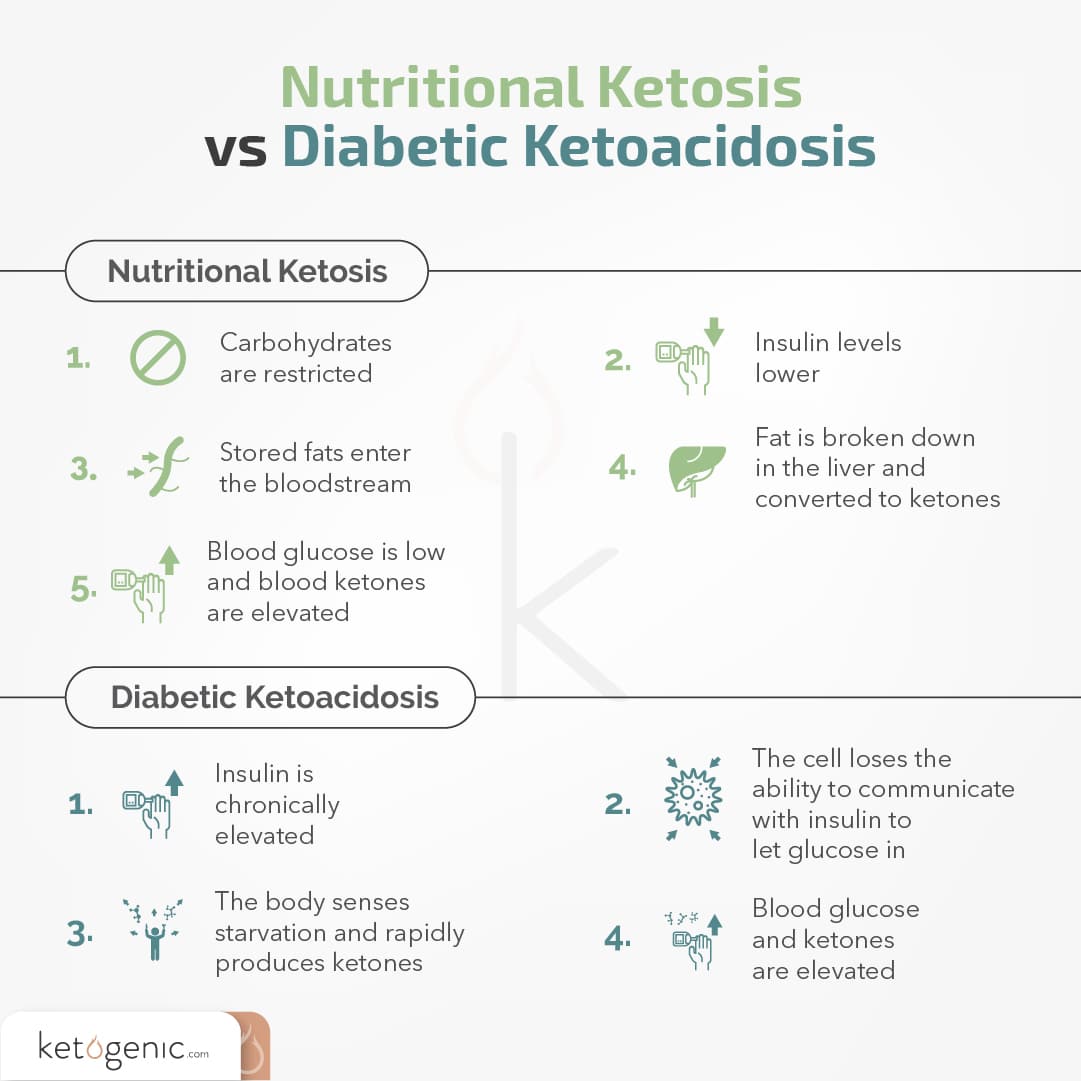
What’s the Difference Between Ketosis and Low-Carb?
When you’re going low-carb, you’re simply reducing your dietary carbohydrate intake and limiting or avoiding carb-heavy foods like wheat bread and pasta.
There are three macronutrients in the human diet: protein, fat, and carbohydrate. Every food is broken down into these nutrients. Some foods contain all macros (macronutrients), and others only contain one or two. With low carb, you’re just lowering one of these macronutrients.
Carbohydrates are a type of nutrient that can be used as energy in the body. Your digestive system turns carbohydrates into glucose or blood sugar, and your body uses this sugar for energy. Any extra sugar is stored in your muscles and liver for later use [11].
The ketogenic diet goes beyond just lowering your carbohydrate intake. It’s a shift in metabolism that can benefit your health. With keto, you increase your consumption of healthy fats, include a moderate amount of protein, and lower your carbs to around 50 grams or less a day. You can decrease your carb consumption, but not necessarily be in a state of ketosis.
How Do You Feel When You’re in Ketosis?
How has ketosis improved your health and wellness? Do you test your ketones?
References
Freeman, J. M., Kossoff, E. H., & Hartman, A. L. (2007). The ketogenic diet: One decade later. Pediatrics, 119(3), 535-543.
Wu, P. Y., Edmond, J., Auestad, N., Rambathla, S., Benson, J., & Picone, T. (1986). Medium-chain triglycerides in infant formulas and their relation to plasma ketone body concentrations. Pediatric Research, 20(4), 338-341.
Cunnane, S. C., & Crawford, M. A. (2003). Survival of the fattest: Fat babies were the key to evolution of the large human brain. Comparative Biochemistry and Physiology, 136(1), 17-26.
Fukao, T., Lopaschuk, G. D., & Mitchell, G. A. (2004). Pathways and control of ketone body metabolism: On the fringe of lipid biochemistry. Prostoglandins, Leukotriens, and Essential Fatty Acids, 70(3), 243-251.
Owen, O. E., Felig, P., Morgan, A. P., Wahren, J., & Cahill Jr, G. F. (1969). Liver and kidney metabolism during prolonged starvation. Journal of Clinical Investigation, 48(3), 574-583.
Levy, R. G., Cooper, P. N., & Giri, P. (2012). Ketogenic diet and other dietary treatments for epilepsy. Cochrane Database of Systematic Reviews, 14(3), CD001903.
Fomin, D. A., McDaniel, B., & Crane, J. (2017). The promising potential role of ketones in inflammatory dermatologic disease: A new frontier in treatment research. Journal of Dermatological Treatment, 28(6), 484-487.
Storoni, M., & Plant, G. T. (2015). The therapeutic potential of the ketogenic diet in treating progressive multiple sclerosis. Multiple Sclerosis International.
Gosmanov, A. R., Gosmanova, E. O., & Dillard-Cannon, E. (2014). Management of adult diabetic ketoacidosis. Diabetes, Metabolic Syndrome, and Obesity, 30(7), 255-264.
McGuire, L. C., Cruickshank, A. M., & Munro, P. T. (2006). Alcoholic ketoacidosis. Emergency Medicine Journal, 23(6), 417-420.
United States National Library of Medicine. Carbohydrates.








